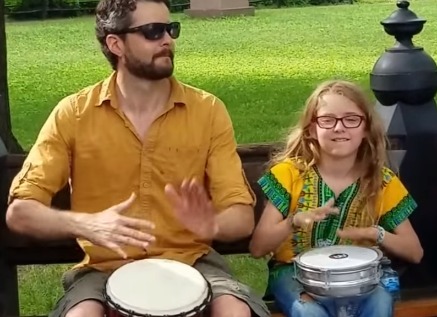“Try not to become a man of success, but rather try to become a man of value.” I have always been fascinated by this inspirational quote from Albert Einstein.
I constantly strive to contribute something of value to the world around me, which is why—in addition to having an almost pathological inborn curiosity to know how things work on a fundamental (or micro) level—I chose to pursue an occupation in medical research. That choice led me to the Liver Research Center at Einstein, where I am a postdoctoral researcher.

The author and his daughter playing drums together in Central Park.
Another inborn trait I am lucky to have is an affinity for music and rhythm. It is probably what made unassisted learning of musical instruments relatively easy for me.
A couple of years ago, a friend from Einstein, Dr. Arijit Bhowmick, also a postdoc, rekindled my passion for playing the djembe—the most widely used of the traditional African drums. My daughter, Hannah, now 11, joined in, and also quickly took a shine to it. Following a few weeks of loud jam sessions at home, and a few merited complaints from our neighbors, the three of us joined a group of drummers who perform every Sunday in Manhattan’s Central Park.
When Worlds Collide
Last summer, while checking the drummming group’s Facebook page for updates, I noticed a post with the Einstein/Montefiore logo. I opened it, wondering what coincidence could bring my workplace and my hobby together. It was an ad requesting a volunteer drummer to facilitate a drumming circle for the Bronx Oncology Living Daily Program (BOLD Living). After a quick round of online research, I learned that it was part of the Psychosocial Oncology Program, a service of the Montefiore-Einstein Center for Cancer Care and the Albert Einstein Cancer Center.
The program, funded by donations from foundations and philanthropists, is a free wellness and support program launched in 2008 to assist those with cancer in the Bronx by helping them cope with their condition and take charge of their needs. Besides drumming circles, the program offers a variety of workshops that include yoga, meditation, music, jewelry making, crochet, Reiki and dance/movement therapy, as well as some workshops for children of cancer patients.
Dividends of the Drum
The idea of volunteering for BOLD seemed like a no-brainer. For me, drumming offered a much needed respite from the daily stress associated with research. For those afflicted by cancer, scientific research has shown that physical group activities such as drumming circles offer patients benefits by lifting their mood, boosting their immune systems and accelerating physical healing. I promptly replied to the ad, stating my connection to Einstein and offering to volunteer. I shared my find with Arijit, who was also excited to join in.
Fast forward a couple of weeks: I was in a conference room, about to start my first drumming session. I found myself surrounded by patients and fellow volunteers, some of whom were BOLD Program staffers. We met, played music, shared stories, laughed, sang and danced in a spirit of cheerfulness and conviviality. The experience exceeded my expectations. I remember leaving the center feeling happy, humbled, inspired, hopeful and recharged. Since then, the two-hour drumming circle has become a monthly ritual I eagerly look forward to. It’s a great opportunity to unwind, connect with inspiring human beings, refocus on the things in life that really matter and renew my enthusiasm for the work I do every day to help cure diseases.
I remind myself that this practice, like any volunteering experience, ends up paying dividends not only to the ones at the receiving end, but perhaps equally to the volunteers.
This might sound self-serving, but for me, sustainable volunteering has to be a two-way street, where all participants gain something of value so that they can in turn contribute something of value to the world around them. This, in my opinion, epitomizes Einstein’s famous quote.

